Jonathan Nilles, a first-year osteopathic medical student and president of DMU’s Oncology Club, recently asked a roomful of people to stand if they’d been impacted by cancer. Everyone rose to their feet. When he asked those who’d been affected by cancer in a loved one age 39 or younger to remain standing, most people in the room did.
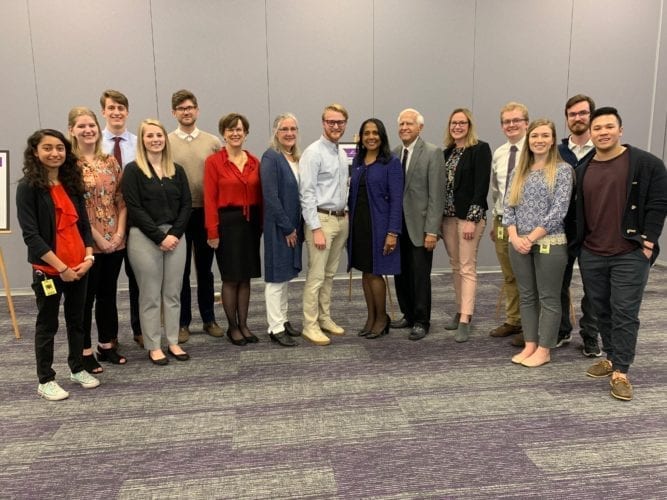
The more than 130 attendees at the Katie Miller Young Adult Cancer Conference at DMU on May 1 shared insights, struggles and questions about the disease in this age group. More than 72,000 adolescents ages 15 to 19 and 60,000 people ages 20 to 39 are diagnosed with cancer each year in the United States. It’s the leading cause of death from disease among females in this age group and is second only to heart disease among males. Survival rates for cancer in young adults have not changed much in recent decades, unlike the improvements seen in many cancers in children and older adults. That’s because too often, symptoms or warning signs are ignored or dismissed due to the age of the patient.
“Cancer is never expected, but it’s particularly surprising and unexpected among young adults,” said keynote speaker Heather Soyer, Psy.D., a psychologist with Blank Children’s Psychological Services in Des Moines. “Cancer is not always detected as quickly as in other age groups.”
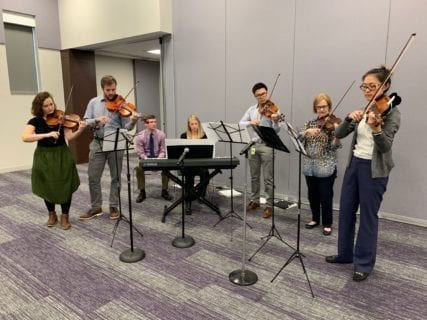
The conference, sponsored by DMU’s continuing medical education program, is named in memory of Katherine Miller, known as “Katie” by her DMU classmates, who was beloved for her kindness, determination, compassion and drive. She succumbed to colon cancer in 2005 at age 26, just six months after being diagnosed. Her family generously supports the conference to honor Katie and other young adult cancer victims and survivors as well as to generate public awareness, discussions and research on the disease.
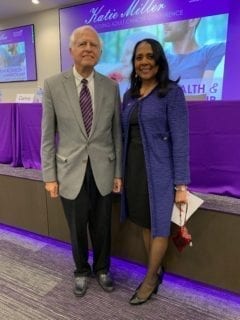
“The conference focuses on young adults, because so little is known about cancer in that population. It’s a problem for people Katie’s age in detecting it or having anybody believe you even have a problem,” said her father, Richard Miller. “As much of a huge loss her death was to us and to the medical profession, she’s helping bring attention to that.”
While cancer is never easy, it can be a particularly complicated experience for young people as they transition to adulthood with all its “instability and unsureness during an age of self-focus and possibilities,” Dr. Soyer said. Its challenges for teens and young adults include reduced independence, self/body image issues, social isolation, dating and sexual health problems, and interruptions in college and career aspirations.
“All of these challenges have a psychological impact, including a lower quality of life, medical adherence problems, depression, high levels of distress and anxiety, and post-traumatic stress symptoms,” she said.
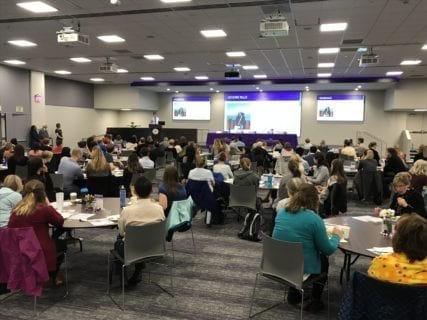
Strategies for health care providers who work with young adults with cancer, she added, include educating them on the importance of adherence to a prescribed medical regime, adequate sleep and exercise, good nutrition and hydration, and connections to social networks as well as to their health care team. Equally important is for these patients to have a “survivorship care plan” once they go into remission.
“Young adult cancer is complex,” Dr. Soyer concluded. “It’s important to understand their life before their cancer, and to continue to check in with cancer survivors.”
A panel discussion followed her keynote address that featured DMU osteopathic student Jordan Little; his mother, Carina; Jeritt Tucker, Ph.D., assistant professor of behavioral medicine, medical humanities and bioethics and a clinical psychologist at the Mary Greeley Medical Center’s Cancer Resource Center; and Ann Benetti, R.N., CHPN, OCN, a nurse navigator at John Stoddard Cancer Center. At age 16, Jordan was diagnosed with acute lymphoblastic leukemia, which required three and a half years of chemotherapy treatments.
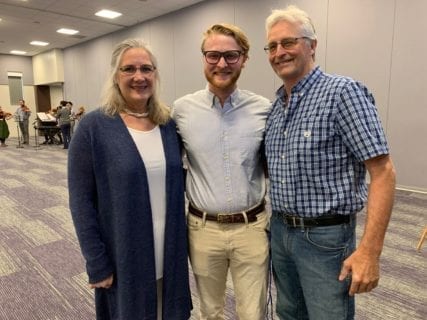
“As I reflect on my journey, I wouldn’t change it. I think it’s made me the person that I am today,” he said. He did note some of his physicians had a “superiority complex” and discouraged deviations from their set treatment plan. “We wanted to know what I could do outside of medicine to help me feel better. But there wasn’t any compromise or willingness to let me be involved in my treatment as much as I wanted.”
Carina encouraged participants at the conference to “experience patients’ daily lives.” She said that Jordan attended a camp for youth with cancer and then returned two years later as a counselor.
“Cancer is why I choose a career in medicine,” he said. “I saw what was missing and wanted to be that advocate for the whole person. Moments were rare when the doctors could sit and ask me, ‘What are you learning in school? How was your track meet?’ We need to understand the patient is a person outside the hospital.”
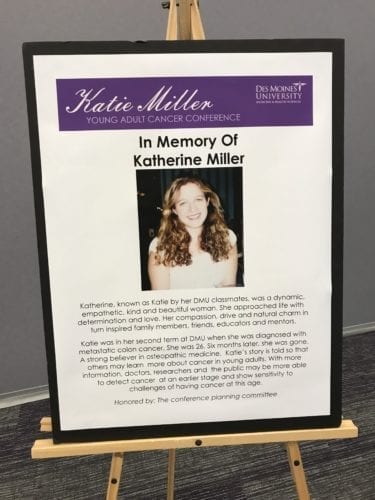
Panelists were asked about the link between young adult cancer and health care provider burnout – how providers can “stay human but also preserve yourself” while treating difficult cases.
“You cry, and it’s okay,” Carina said.
“When I got my diagnosis, I didn’t want to feel anything, and that’s such a dangerous thing to do,” Jordan added. “That’s where burnout comes from. Let yourself feel something. If you need to cry, cry. If you need to laugh, laugh.”
Ann encouraged the audience to “lean into” the realities of cancer’s physical and emotional challenges.
“Those conversations with patients are hard, and there is suffering. It’s the byproduct of cancer. I am very frank with my patients as I guide them through all of the issues and questions they need to address and be ready for,” she said. “But it’s also what I do with [the suffering] afterward. I may drink a glass of wine with my sisters, play with my nieces and nephews or bury myself in a good book.”
Jordan suggested people change their mindset toward cancer. “You often see people approach cancer as a battle. That has the connotation there will be a winner, and there will be a loser,” he said. “Instead, I imagined my cancer as a dance, with all this pushing and pulling. When you look at it as a dance rather than a battle, there is no loser.”

